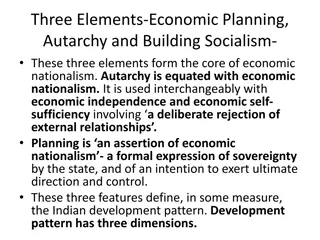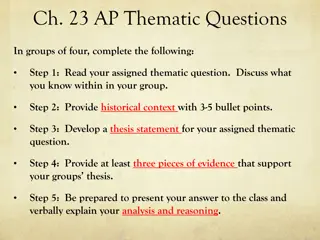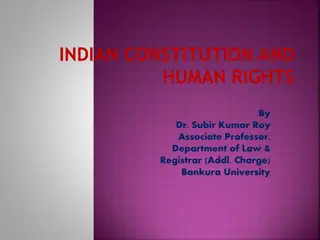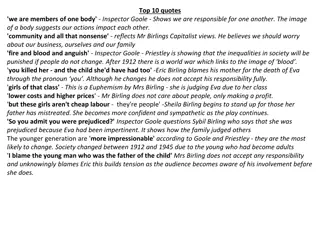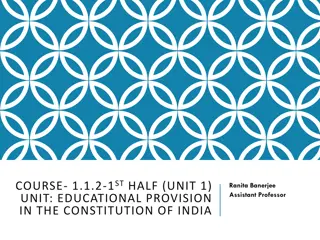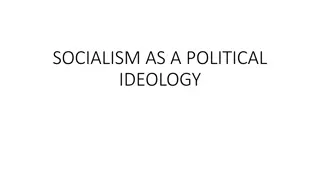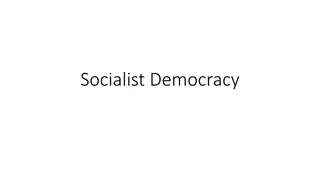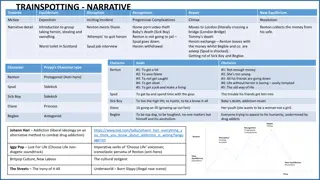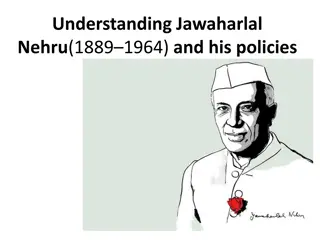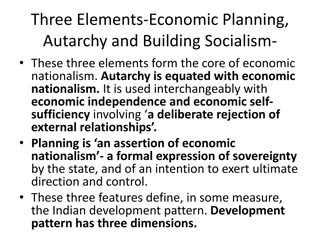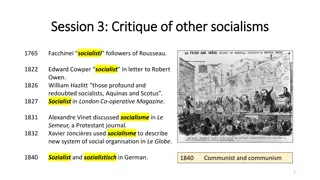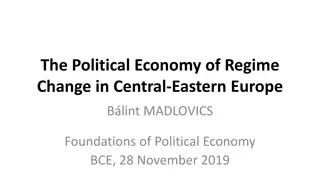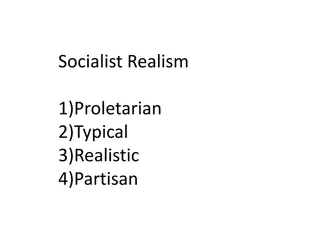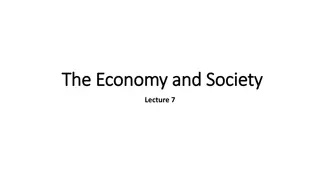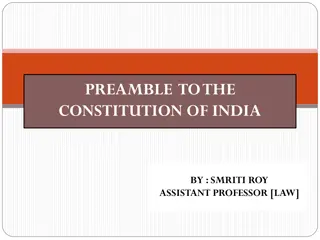The Development Pattern and Rationale Behind Economic Nationalism in India
Three core elements - economic planning, autarchy, and building socialism - define India's development pattern focused on self-sufficiency and state ownership of industries. The rationale behind this approach is debated between economic theory influences and Marxist perspectives, reflecting a commit
6 views • 14 slides
Industrialization and Its Impact on Politics and Society in Western Europe
Industrialization spread through Germany and western Europe in the late 19th century, bringing about significant changes to politics and society. Governments implemented reforms to improve workers' lives, consumerism influenced the middle class and working people, and mass political movements aimed
0 views • 23 slides
Indian Constitution and Human Rights: A Comprehensive Overview
The Indian constitution embodies justice in social, economic, and political spheres, aiming for the full development of every individual. Rooted in democratic principles and socialism, the preamble emphasizes liberty, equality, and justice. Drawing wisdom from leaders like Dr. Ambedkar and Mahatma G
0 views • 10 slides
Insights Into 'An Inspector Calls' Characters
In "An Inspector Calls," the Inspector represents socialism, with an air of solidity and omniscience. He delivers a warning about mankind needing to change and accept responsibility. Mr. Birling, on the other hand, embodies capitalism, shown as unlikeable and out of touch. The play critiques Birling
0 views • 7 slides
Insights into "An Inspector Calls": Themes and Contexts
A detailed exploration of key quotes and themes from "An Inspector Calls" by J.B. Priestley, such as responsibility, class divides, and societal change. The analysis delves into characters' perspectives, societal norms of the Edwardian era, and the impact of significant events like World War I. The
0 views • 5 slides
Educational Provisions in the Constitution of India
The Constitution of India, adopted in 1949, serves as the supreme law outlining the fundamental structure, government institutions, rights, duties of citizens, and more. It emphasizes sovereignty, socialism, and secularism, establishing India as an independent, democratic, and inclusive nation.
0 views • 41 slides
Understanding Socialism: A Comprehensive Overview
Socialism is a political and economic ideology that advocates for collective or state ownership of production, distribution, and exchange. It emerged in the early 19th century as a response to industrial capitalism, aiming for a more egalitarian society that prioritizes collective well-being. Social
0 views • 9 slides
Understanding Socialist Democracy: A Political Ideology Explained
Socialist democracy is a political idea that combines elements of democracy and socialism, rejecting capitalism and authoritarian socialism. Proponents advocate for democratic decision-making and public ownership of the means of production. They believe in economic equality, government regulation of
2 views • 13 slides
Understanding Fundamental Principles of Public Finance
Public Financial Management involves the management of public funds, focusing on goals, objectives, and ideologies shaping government functions. Concepts such as laissez-faire and socialism influence how governments provide services, enforce laws, protect private interests, and promote social welfar
0 views • 86 slides
Understanding Mixed Economy: A Balanced Economic Model
Mixed economy combines elements of socialism and capitalism, allowing both public and private sectors to coexist. Government intervention aims to achieve a balance between individual initiatives and societal goals, promoting economic development while addressing inequalities. Features include econom
0 views • 15 slides
Exploring Ideology and Narrative in Trainspotting
A deep dive into the narrative structure and ideological themes of the film Trainspotting, examining character goals, obstacles, and the protagonist's journey through addiction and self-discovery. The film's portrayal of addiction, socialism, liberalism, and post-Thatcherite counter-culture is explo
1 views • 7 slides
Jawaharlal Nehru: Visionary Leader and Architect of Modern India
Jawaharlal Nehru, a prominent leader of India's nationalist movement, played a crucial role in shaping the country's policies post-independence. As India's first Prime Minister, he focused on pillars like democracy, socialism, secularism, and nationalist unity. Nehru's domestic policies emphasized s
0 views • 8 slides
Building Socialism: Strategies for Social Change and Political Action
Explore the process of social change towards socialism through mass action, organization, and the building of a socialist party. Emphasizing the importance of campaigns, reforms, and transitional methods, the journey involves uniting the working class, challenging the capitalist system, and particip
4 views • 10 slides
Exploring Exposition and Tolerance in "The Red Umbrella
In the lesson prepared by Jim, Sally, and Bob focusing on exposition, vocabulary, and examples of tolerance/intolerance in the first three chapters of "The Red Umbrella," key vocabulary words like "caravan," "oblivious," and "socialism" are explored. Discussion questions prompt critical thinking on
0 views • 6 slides
Understanding Moral and Constitutional Values in Relation to Judiciary
Explore the concepts of moral values and constitutional values, emphasizing their importance in decision-making processes and societal norms. Discover the stages of moral development and delve into constitutional values such as sovereignty, socialism, secularism, democracy, justice, liberty, equalit
0 views • 9 slides
The Legacy of Robert Burns: Scotland's National Poet
Robert Burns, also known as the Bard, was a significant figure in Scottish literature, representing Pre-Romanticism with his exploration of emotions and folk literature. His enduring appeal led to his influence on liberalism and socialism. Burns collected and adapted folk songs, with "Auld Lang Syne
0 views • 16 slides
Understanding Communism, Marxism-Leninism, and Socialism Through Visuals
Explore the concepts of communism, Marxism-Leninism, and socialism through images and definitions. Learn about different economic systems and key figures like Leon Trotsky, Che Guevara, and Fidel Castro, and consider why they are idolized by young Iranian children.
0 views • 11 slides
Economic Nationalism and Development Pattern in India
Economic nationalism in India was characterized by the elements of economic planning, autarchy, and socialism. The development pattern focused on capital goods industries, inward orientation, and state ownership. Two interpretations of this pattern were influenced by economic theory and Marxist pers
0 views • 13 slides
Exploring the Historical Context of 'An Inspector Calls' by JB Priestley
Explore the historical context surrounding the time period in which JB Priestley's play "An Inspector Calls" is set and was written. Delve into the significant events such as the sinking of the Titanic, World War One and World War Two, the class system, socialism vs capitalism, and the changing role
0 views • 30 slides
The French Revolution: A Catalyst for Modern Transformation
The French Revolution, a historical turning point, challenged traditional authority structures and introduced ideologies like liberalism, republicanism, and socialism. This era of societal upheaval posed questions about the nature of power and governance, leaving a complex legacy that continues to i
0 views • 39 slides
Demographic Shifts in Central and Eastern Europe Post-1989: A Closer Look
The collapse of state socialism in Central and Eastern Europe in 1989-91 brought about significant changes, leading to economic and social transformations. The region experienced new political and economic freedoms, although inequalities grew. Unique demographic divides between East and West Europe
0 views • 43 slides
Critique of Various Socialisms Throughout History
Critique various socialisms from history - including feudal socialism, petty-bourgeois socialism, and German or True Socialism. Discusses the origins, criticisms, and impact of these ideologies on societal structures and historical movements.
0 views • 14 slides
The Political Economy of Regime Change in Central-Eastern Europe
The content discusses the concepts of socialism and capitalism, exploring various models and transitions from socialism to capitalism. It focuses on regime changes in Central and Eastern Europe, with case studies on Poland and Hungary. The text covers different varieties of socialism and their econo
0 views • 21 slides
Soviet Socialist Realism: Artistic Representation of Revolutionary Development
Socialist Realism emerged as the fundamental method of Soviet literature and art, emphasizing truthful and historically concrete depictions of reality within a revolutionary context. It required artists to engage in ideological transformation and educate the masses in the spirit of socialism. This a
0 views • 21 slides
Understanding the Interplay of Economy, Politics, and Society
Exploring the connections between politics, economy, and society, this lecture delves into the influence of economic systems like capitalism and socialism on political structures. It discusses how economic conditions shape politics and social divisions, emphasizing the intertwined nature of these as
0 views • 15 slides
Paradoxes and Tensions in Post-Reform Chinese Media Politics
This presentation delves into the complexities of Chinese media politics in the post-reform era, highlighting the unique dynamics between state control and commercialization. It explores the paradoxes and tensions within the Chinese media landscape, such as censorship fears of neo-Maoist influences
0 views • 9 slides
Overview of the Preamble to the Constitution of India
The Preamble to the Constitution of India serves as a concise introduction, outlining the foundational principles and objectives of the nation, including sovereignty, socialism, secularism, democracy, justice, liberty, equality, and fraternity. It reflects the vision of the framers and sets the tone
0 views • 15 slides
